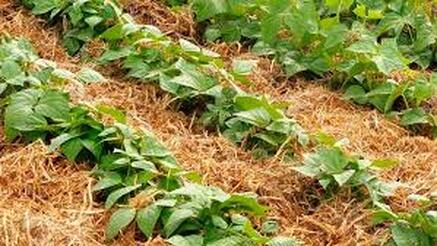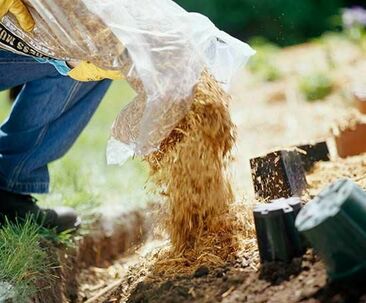Bottom line on top:
- Mulching is the practice of covering the dirt that surrounds your plants
- Mulching prevents weeds from growing while enriching the soil and regulating moisture levels
- Most home gardeners have access to free organic materials that can be used, and if not there are a wide variety of options available for purchase
Mulching in the garden?
Mulching flower beds and around bushes in the front yard is standard practice for professional and amateur landscapers alike - but I should be mulching inside my garden too? The answer is yes, the reasons why are largely the same, but you probably don't want to use the same stuff.
Why should I mulch in my garden?

Simply put, it makes gardening easier. Here's why
- Less Weeding. You'll never completely eliminate the need for weeding, but you can actually get pretty close by providing a thick layer of mulch around your plants. For the most part it will prevent any weeds from popping through, and the ones that do make it will be weak and easy to pull out.
- Moisture Control. Believe it or not, mulch will actually help you whether you have too much water or not enough. If you get heavy rain in a well mulched bed, the mulch will absorb a lot of water that otherwise would be sitting in puddles. It also prevents the raindrops from splashing dirt on your plant's leaves when they bounce off the layer of mulch instead. During a drought, the same mulch will act like a blanket protecting your garden from the hot sun. Without it, the moisture in the soil would easily evaporate and escape while the layer of mulch delays that process significantly.
- Enriches the soil. Over time your mulch will decompose, releasing nutrients back into the soil as your growing plants are taking them away.
What can I use for garden mulch?
What you're looking for is something organic and preferably free. There are some inorganic options that we list below however we personally don't use them. While there are certainly advantages over organic mulch in theory, we honestly just prefer to use all-natural everything whenever possible. You can feel good about what is surrounding your plants and at the end of the season instead of cleaning up rolls of plastic, the mulch we use becomes part of the soil. Better for the planet and our laziness, everyone wins.
Organic options:
You may want to avoid:
Non-organic options:
Organic options:
- Grass clippings. We have a large backyard so this is what we use. Every time we mow the lawn a thick layer is spread out over a freshly weeded bed or walkway. Some people will tell you this isn't a great idea because you are adding grass or weed seeds into your garden, but we have found that if you apply it thick enough this really isn't a concern. Not to mention it's a great kill-2-birds-with-1-stone kind of thing because you have a place and a purpose for something you'd otherwise need to discard.
- Straw. Probably the best option for an organic mulch because it's unlikely to contain seeds. Only problem is you need to know where to get it and pay for it.
- Hay. Most hay contains a variety of seeds, so buyer beware on this one. But if it's something you have access to a lot of for free, much like the grass clippings, if you just apply it thick enough there are definitely more pros than cons.
- Wood chips. Another one you can get for free or really cheap from a local tree removal service. We use these all over our property but not in the garden - only because they tend to have sharp edges and we do most of our gardening barefoot.
You may want to avoid:
- Leaves. Unless you can chip them up, they may clump together and prevent proper air and water flow. We will use whatever the lawnmower picks up but don't rake large amounts of leaves in to use as garden mulch.
- Commercial/colored bark mulches. These might look pretty, but that "redwood bark" mulch is really spray painted wood chips. Same for the black or any other color. You'd be better off using the untreated wood chips that these start off as.
- Pine needles. We do use these as a mulch for our raspberry and blueberry plants but that's because they are the type of plants that love the acidity in pine needles. The vegetables in your garden do not.
Non-organic options:
- Plastic. There are a lot of options for rolls of plastic landscaping material that range from fairly cheap to expensive. Plastic mulch has the advantage of warming the soil which can be a huge asset up north but it also prevents water from penetrating the soil so it works best with containers or a drip irrigation system that can water from under the plastic. This is probably the way to go if you're doing a patio garden or are somewhere you wouldn't have access to yard waste, etc.
- Landscaping fabric. Many people use these to control weeds under bark mulch in the front yard but they can be used in the garden as well. They will not warm the soil but they do allow water to flow through naturally. Probably the best long-term option as some of them claim to block weeds for up to 10 years (I haven't had quite that level of success with them but maybe I was just using the wrong ones).
How much should I use?
Just like your lame excuse for why you have to take the day off of work to plant your seeds, it's time to lay it on thick. You don't want it so ridiculous that your plant is growing in a hole between giant mounds of dead grass, but you do want to apply a thick enough layer so that it will block out all sunlight from reaching the soil below.
Tips and Tricks
- Mulch cools the soil temperature underneath, so you may need to avoid using it early on in some beds. For example, if you plan on planting squash and pumpkins from seed, the soil temperature needs to be 60 degrees for the seeds to germinate. If you live in New England or a similar climate with a short growing season, you definitely don't want to apply any mulch until the soil has reached the desired temperature. We usually wait until the seeds have sprouted and the plants are somewhat mature before mulching around them.
- Grass clippings are much easier to spread as soon as they are cut and still green. If you pile them up and plan to spread them later they will be clumped together and difficult to spread.
The 4 Keys To Gardening Success
Mulching is of our 4 keys to organic gardening success. Check out the rest of the series:
